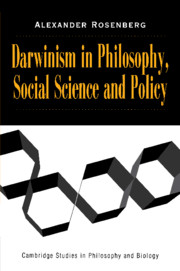Book contents
- Frontmatter
- Contents
- Introduction
- 1 A Field Guide to Recent Species of Naturalism
- 2 Naturalistic Epistemology for Eliminative Materialists
- 3 Limits to Biological Knowledge
- 4 Reductionism Redux: Computing the Embryo
- 5 What Happens to Genetics When Holism Runs Amok?
- 6 The Biological Justification of Ethics: A Best-Case Scenario
- 7 Moral Realism and Social Science
- 8 Contractarianism and the “Trolley” Problem
- 9 Does Evolutionary Theory Give Comfort or Inspiration to Economics?
- 10 The Political Philosophy of Biological Endowments: Some Considerations
- 11 Research Tactics and Economic Strategies: The Case of the Human Genome Project
- Bibliography
- Index
10 - The Political Philosophy of Biological Endowments: Some Considerations
Published online by Cambridge University Press: 06 July 2010
- Frontmatter
- Contents
- Introduction
- 1 A Field Guide to Recent Species of Naturalism
- 2 Naturalistic Epistemology for Eliminative Materialists
- 3 Limits to Biological Knowledge
- 4 Reductionism Redux: Computing the Embryo
- 5 What Happens to Genetics When Holism Runs Amok?
- 6 The Biological Justification of Ethics: A Best-Case Scenario
- 7 Moral Realism and Social Science
- 8 Contractarianism and the “Trolley” Problem
- 9 Does Evolutionary Theory Give Comfort or Inspiration to Economics?
- 10 The Political Philosophy of Biological Endowments: Some Considerations
- 11 Research Tactics and Economic Strategies: The Case of the Human Genome Project
- Bibliography
- Index
Summary
Is a government required or permitted to redistribute the gains and losses that differences in biological endowments generate? In particular, does the fact that individuals possess different biological endowments lead to unfair advantages within a market economy? These are questions on which some people are apt to have strong intuitions and ready arguments. Egalitarians may say yes and argue that as unearned, undeserved advantages and disadvantages, biological endowments are never fair, and that the market simply exacerbates these inequities. Libertarians may say no, holding that the possession of such endowments deprives no one of an entitlement and that any system but a market would deprive agents of the rights to their endowments. Biological endowments may well lead to advantages or disadvantages on their view, but not to unfair ones.
I do not have strong intuitions about answers to these questions, in part because I believe that they are questions of great difficulty. To begin, alternative answers rest on substantial assumptions in moral philosophy that seem insufficiently grounded. Moreover, the questions involve several problematical assumptions about the nature of biological endowments. Finally, I find the questions to be academic, in the pejorative sense of this term. For aside from a number of highly debilitating endowments, the overall moral significance of differences between people seems so small, so interdependent and so hard to measure, that these differences really will not enter into practical redistributive calculations, even if it is theoretically permissible that they do so.
Before turning to a detailed discussion of biological endowments and their moral significance, I sketch my doubts about the fundamental moral theories that dictate either the impermissibility or the obligation to compensate for different biological endowments.
- Type
- Chapter
- Information
- Darwinism in Philosophy, Social Science and Policy , pp. 195 - 225Publisher: Cambridge University PressPrint publication year: 2000
- 1
- Cited by



